
- Average Rating:
- Not yet rated
- Topic Areas:
- Topical Panels | Therapeutic Relationship | Therapist Development | Psychotherapy
- Categories:
- Evolution of Psychotherapy | Evolution of Psychotherapy 1995
- Faculty:
- William Glasser, MD | Lynn Hoffman, ACSW | Ernest Rossi, PhD | Joseph Wolpe, M.D.
- Duration:
- 54 Minutes
- Format:
- Audio Only
- Original Program Date:
- Dec 16, 1995
- Short Description:
- Panel 14 from the Evolution of Psychotherapy 1995 - Role of the Therapist / Role of the Client Featuring William Glasser, M.D.; Lynn Hoffman, A.C.S.W.; Ernest Rossi, Ph.D.; and Joseph Wolpe, M.D. Moderated by Betty Alice Erickson, MS.
- Price:
- $15.00 - Base Price

- Average Rating:
- Not yet rated
- Topic Areas:
- Topical Panels | Resistance | Psychotherapy
- Categories:
- Evolution of Psychotherapy | Evolution of Psychotherapy 1995
- Faculty:
- James Bugental, PhD | Albert Ellis, PhD | Otto Kernberg, MD | Erving Polster, PhD
- Duration:
- 1 Hour 2 Minutes
- Format:
- Audio Only
- Original Program Date:
- Dec 16, 1995
- Short Description:
- Panel 15 from the Evolution of Psychotherapy 1995 - Resistance Featuring James F.T. Bugental, Ph.D.; Albert Ellis, Ph.D.; Otto Kernberg, M.D.; and Erving Polster, Ph.D. Moderated by Camillo Loriedo, MD
- Price:
- $15.00 - Base Price

- Average Rating:
- Not yet rated
- Topic Areas:
- Topical Panels | Law & Ethics | Psychotherapy | Therapist Development
- Categories:
- Evolution of Psychotherapy | Evolution of Psychotherapy 1995
- Faculty:
- Cloe Madanes, HDL, LIC | Margaret Singer, PhD | Thomas Szasz, MD | Jeffrey Zeig, PhD
- Course Levels:
- Master Degree or Higher in Health-Related Field
- Duration:
- 59:33
- Format:
- Audio Only
- Original Program Date:
- Dec 16, 1995
- Short Description:
- Panel 16 from the Evolution of Psychotherapy 1995 - Key Ethical Considerations Featuring Cloe Madanes, Lic. Psychol.; Margaret Singer, Ph.D.; Thomas Szasz, M.D.; and Jeffrey K. Zeig, Ph.D. Moderated by Bernhard Trenkle, Dipl. Psych.
- Price:
- $15.00 - Base Price

- Average Rating:
- Not yet rated
- Topic Areas:
- Topical Panels | Sex and Sexuality | Psychotherapy
- Categories:
- Evolution of Psychotherapy | Evolution of Psychotherapy 1995
- Faculty:
- Albert Ellis, PhD | Otto Kernberg, MD | Joseph LoPiccolo, PhD | Judd Marmor
- Duration:
- 1:05:40
- Format:
- Audio Only
- Original Program Date:
- Dec 16, 1995
- Short Description:
- Panel 17 from the Evolution of Psychotherapy 1995 - Sexuality Featuring Albert Ellis, Ph.D.; Otto Kernberg, M.D.; Joseph LoPiccolo, Ph.D.; and Judd Marmor, M.D. Moderated by Betty Alice Erickson, MS.
- Price:
- $15.00 - Base Price

- Average Rating:
- Not yet rated
- Topic Areas:
- Topical Panels | Psychotherapy
- Categories:
- Evolution of Psychotherapy | Evolution of Psychotherapy 1995
- Faculty:
- Mary Goulding, MSW | James Hillman, PhD | James F. Masterson, MD | Salvador Minuchin, MD
- Course Levels:
- Master Degree or Higher in Health-Related Field
- Duration:
- 57:27
- Format:
- Audio Only
- Original Program Date:
- Dec 16, 1995
- Short Description:
- Panel 18 from the Evolution of Psychotherapy 1995 - Therapeutic Neutrality or Social Commitment? Featuring Mary Goulding, M.S.W.; James Hillman, Ph.D.; James Masterson, M.D.; and Salvador Minuchin, M.D. Moderated by Camillo Loriedo, MD.
- Price:
- $15.00 - Base Price
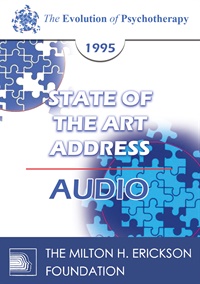
- Average Rating:
- Not yet rated
- Topic Areas:
- State of the Art Address | Children and Adolescent Therapy | Psychotherapy
- Categories:
- Evolution of Psychotherapy | Evolution of Psychotherapy 1995
- Faculty:
- Stella Chess, MD
- Duration:
- 56 Minutes
- Format:
- Audio Only
- Original Program Date:
- Dec 16, 1995
- Short Description:
- The implications of our investigations into the nature and influence of temperament will be· elaborated by the concepts of temperament-environment interactions, goodness of fit and parent guidance as well as guidance of adolescents and adults in psychotherapy. These formulations will be applied to psychotherapeutic clinical practice with children, adolescents and adults. A 22 minute illustrative videotape will be shown.
- Price:
- $15.00 - Base Price
Tags: Adolescents Children Psychotherapy
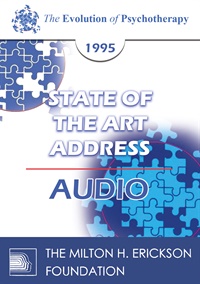
- Average Rating:
- Not yet rated
- Topic Areas:
- State of the Art Address | Psychotherapy | Relationships
- Categories:
- Evolution of Psychotherapy | Evolution of Psychotherapy 1995
- Faculty:
- Lynn Hoffman, ACSW
- Duration:
- 54 Minutes
- Format:
- Audio Only
- Original Program Date:
- Dec 13, 1995
- Short Description:
- This talk proposes to separate psychotherapy approaches into two groups: one called the "psychological therapies," focused on the growth and development of the individual psyche, and the other, the "social therapies," which deal with broader issues of relationship and the social web. My aim is to create a freer field for dialogue between two points of view that are historically independent from each other and that derive from a different conceptual base.
- Price:
- $15.00 - Base Price
Tags: Psychotherapy Relationships
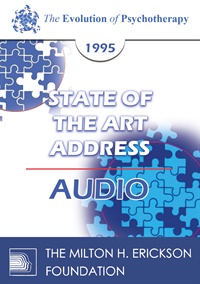
- Average Rating:
- Not yet rated
- Topic Areas:
- State of the Art Address | History of Psychotherapy | Psychotherapy
- Categories:
- Evolution of Psychotherapy | Evolution of Psychotherapy 1995
- Faculty:
- Margaret Singer, PhD
- Duration:
- 1 Hour 3 Minutes
- Format:
- Audio Only
- Original Program Date:
- Dec 16, 1995
- Short Description:
- During the five decades that I have been a psychologist, I have seen a series of psychotherapeutic practices come and go. Today, one in three Americans has visited one or another of the 250,000 accredited practitioners making offerings. Not only has the number of therapists burgeoned, but also the varieties of therapy have become a veritable smorgasbord. Assumptions underlying various bursts of therapist zeal will be explored and linked to prominent cultural and social forces in recent history.
- Price:
- $15.00 - Base Price
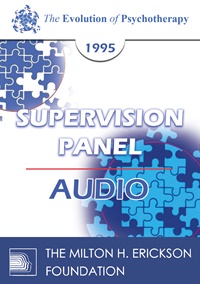
- Average Rating:
- Not yet rated
- Topic Areas:
- Supervision Panels | Supervision | Psychotherapy
- Categories:
- Evolution of Psychotherapy | Evolution of Psychotherapy 1995
- Faculty:
- James Bugental, PhD | James F. Masterson, MD | Donald Meichenbaum, PhD
- Duration:
- 58 Minutes
- Format:
- Audio Only
- Original Program Date:
- Dec 15, 1995
- Short Description:
- Supervision Panel 1 from the Evolution of Psychotherapy 1995 - Bugental, Masterson and Meichenbaum Educational Objective: To compare and contrast clinical and philosophical perspectives of experts.
- Price:
- $15.00 - Base Price
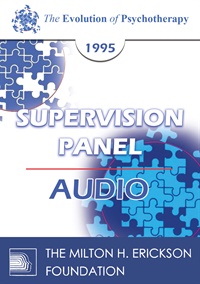
- Average Rating:
- Not yet rated
- Topic Areas:
- Supervision Panels | Supervision | Psychotherapy
- Categories:
- Evolution of Psychotherapy | Evolution of Psychotherapy 1995
- Faculty:
- William Glasser, MD | Cloe Madanes, HDL, LIC | Irvin Yalom, PhD
- Duration:
- 55:27
- Format:
- Audio Only
- Original Program Date:
- Dec 15, 1995
- Short Description:
- Supervision Panel 2 from the Evolution of Psychotherapy 1995 - Glasser, Madanes and Yalom Educational Objective: To compare and contrast clinical and philosophical perspectives of experts.
- Price:
- $15.00 - Base Price
Please wait ...

